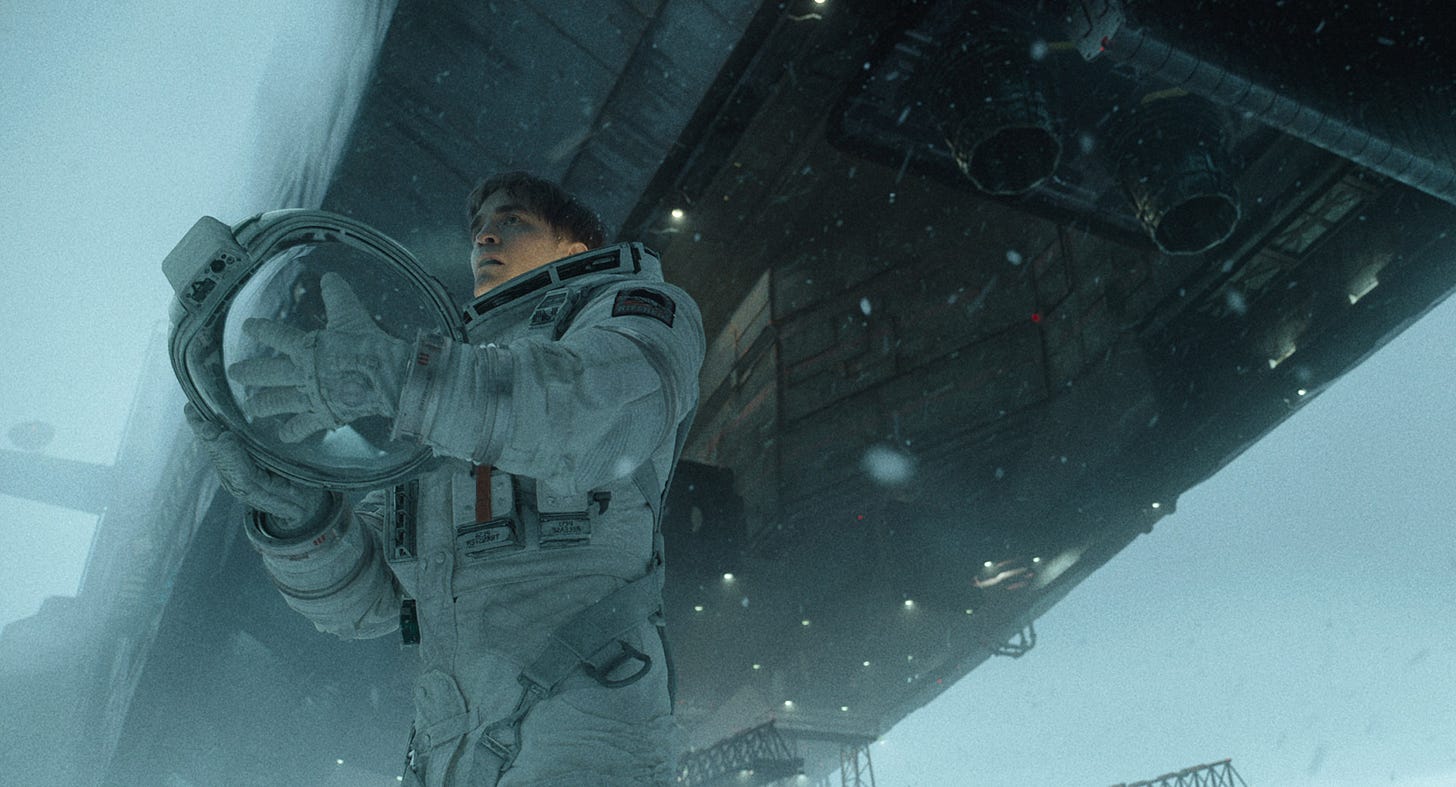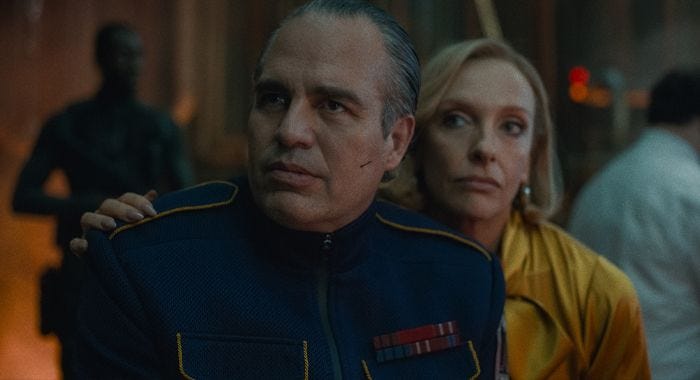Why have character progression when you can have propaganda instead?
A case study of Mickey 17, exploring how agenda-pushing over compelling characters destroys the art of storytelling.
You were expecting a poem: that’s on the way for next week. Here’s a film review in the meantime.
At the beginning of March, me and fellow Substacker Lara went to see Bong Joon-Ho’s Mickey 17 on its opening night. I’m a fan of his other films, especially Parasite and that film’s ability to portray very human characters - flaws and all - getting in to ever-more gut-wrenching situations in order to survive their life circumstances, intertwined with nuanced, unpreachy commentary on class distinctions.
As such, I went into this film somewhat optimistic that I might be in for a good time, despite knowing pretty much nothing about the film. What I ended up watching did not feel on the same calibre of his previous filmmaking efforts.
We discussed the film at length afterwards over a curry. There were some small standout bits that both of us really enjoyed. The film’s premise - having an “expendable” worker who can be reprinted in full every time they die - brings with it a wealth of ethical and moral depth to explore. It’s a great concept that the film seems to at least be somewhat conscious of. I also like how the film deals with its alien race and the sense of personality they’re given to help lighten what is otherwise a pretty sci-fi heavy film. Bong Joon-Ho’s decision to make the protagonist more of a klutz as opposed to his original screenplay treatment of being more intellectually-minded was a wise move in my eyes, too.
Those are the positives I can give the film credit for. For me, everything else I experienced turned into a lesson of what not to do when it comes to creating compelling characters and executing on the central ideas of the plot. I can’t help but feel that Mickey 17 is exactly what happens when the desire to push obtuse cultural agendas in the arts takes over the need to tell a coherent, meaningful story. This is a theme I’ve explored in some of the reflections of my recent poems.
With how concrete and contemporary of an example Mickey 17 is of this, it felt apt to do a deeper dive into some of its intricacies to highlight the pitfalls that the current generation of the arts is falling into. Mickey 17 could have been an excellent film; here’s why it missed the mark for me.
Exposition & Narrative Nudges
A significant portion of the film’s runtime is entirely exposition, detailing the backstory of the central protagonist, Mickey, and the context surrounding why there is a spaceship hurtling towards an uncolonised planet with a human printing machine on-board, all to the tune of a fairly uninteresting narration from the title character.
I struggle to find sequences of this much exposition compelling, and Mickey 17 is no exception. Rather than using character interactions and interesting dialogue to explore these things, we get the inclusion of characters who literally are just convenient exposition devices - like Timo, Mickey’s “friend”.
What was perhaps more insulting is that this dry info-dump took the time to pack-in almost every political and cultural agenda under the sun. The idea of the antagonist - Kenneth Marshall - being a failed showman of a politician, more flashy words than smart action, leading up this voyage is one that, given the film’s concept, I quite like. By the character being deliberately made into a Trump caricature - dance moves, intonation, supporter base stereotypes and all - and having a cheap gag of him crying to his wife constantly about how hard things are, any interesting commentary that could be gleamed from his inclusion is lost for me by going full “orange man bad”. I say this as someone who finds discomfort in Trump’s cosying-up to technocrats, Making America Zionism Great Again and ongoing support for the pharmaceutical industry.
This is what most of the online discourse surrounding this film has been centred around, with praise from media outlets about how this is “the anti-Trump film people deserve” and the corresponding backlash from Trump’s fanbase. Yet the agenda pushing goes far beyond this. There is a segment dedicated to how Mickey becomes a saviour for the human race by getting himself infected with a deadly virus, dying several times, and having his biological data harvested and used to develop a vaccine so that he leaves a meaningful “contribution to the human race”. I nearly choked in the cinema at how on-the-nose this was.
There is also the romance between Mickey and Nasha which covers a portion of this exposition dump. Their relationship is characterised almost entirely by Nasha’s sexual fetishes and desires as opposed to any meaningful connection. Naturally, this is the character who goes on to be the saviour of the story without any significant personal development forcing her to look at the behaviours and traits that bring her into conflict with others. With how prevalent this has become in other films, part of me is not surprised. What upsets me more, however, is how other female characters with somewhat more depth and development - from the other shipmate Kai, who loses her best friend in an accident and falls in love with Mickey as a coping mechanism for her grief, to the socially-awkward scientist who realises the cognitive abilities of this planet’s aliens and bonds with Mickey over their realisations - suffer from too-short storylines or an introduction so late in the plot that there’s almost no time to flesh out the character fully. I get the impression that this film’s definition of “female empowerment” means giving a free pass to any destructive behaviours, rather than celebrating the journey that female characters could go on to overcome them and become an even better character in the process. That is the antithesis of a hero’s journey and of telling a compelling story.
Then, there’s how the film deals with its central plot device - the human printing machine. Rather than getting a situation- and/or character-based exploration of the moral implications of this device to drive the main plot forwards, we get a series of narrated flashbacks where we’re told how scientists and ethicists debated the implications of such a device, how one of the developing scientist used the machine to commit a litany of murders, and all sorts of sequences that fly in the face of a “show don’t tell” ethos. These sequences did not make for compelling cinema for me.
Missed Opportunities
The handling of the human printer as a plot device is a clear example of how many missed opportunities this film had for me. There could have quite easily been another character on the ship who chooses to use the printing machine in nefarious ways in a far more engaging manner than in the flashbacks that also drives the plot forward. We even get a hint that something like this might have been considered; Mickey’s nightmare of Trump Marshall’s wife bringing him back to life after he is killed is a plot twist that could’ve gone a good way to strengthening this film had they run with it as reality.
The same goes for the handling of the supporting characters. The “guys can be jerks” character of Timo and most of the sequences on Earth involving him and Mickey trying to escape loan sharks could have probably been cut, with the screentime reallocated to fleshing out the character arcs of the more notable characters. We could have had these characters more intimately involved with the human printing device too - what if Kai reprinted her friend earlier in the plot, violating the ship’s protocol and suffering the consequences, only then to find their friendship is not the same? What if Nasha was the one sent by the loan sharks to get Mickey to pay up, and realises the power of the printing device to circumvent the violent desires of her boss?
For me, all this goes to show how a good idea can get lost in its execution. I use “execution” in a twofold meaning here, both to describe the carrying-out of the idea to tangible completion, and in death. Mickey 17’s potential died on the cutting-room floor so that dying societal agendas could take another pitiful breath. I could nitpick away at a bunch of other aspects of the film that caused a disturbance in me, but the aspects I’ve mentioned were the ones that needed highlighting the most.
A Valuable Experience
With all of this said, it might surprise you to hear that I’m grateful I was able to see this film - cultural programming, bad characters and all. Sometimes it’s useful to have references on what not to do when creating stories to inspire future generations. When I see films like this, I do the same as when I see deliberately-framed news items or posts on social media. I celebrate what is in alignment with what I feel to be true, then honour and discard what is not from my consciousness. This is the process that allows me to sharpen my intention as I move through the world - whether that takes the form of writing poetry or holding space for youth.
Intention is what matters most, not perfection. Furthermore, I believe stories carry their own intention which should be honoured in the process of creating art. I can hold films that remain true to the intention of their story in high regard, even if their pacing or dialogue is clumsy in places (The Book of Vision comes to mind for me). Films that sacrifice the intention to tell a good story in order to promote shallow, outdated and divisive narratives of how others “should” be will not hold the same status in my consciousness. Mickey 17 falls into the latter category for me.
I’m here to tell the best story I can of my own life, and share stories and analogies which help others do the same. I honour and thank Mickey 17 for sharpening my own blade through showing me what not to do when creating compelling and truthful narratives. Now I let it go into the sea of the myriad of other films that do the same, letting them run their course and prepare the world for even better stories to take their place.
Maybe it’ll be me who creates something that brings the update. Maybe it’ll be you. Either way, I look forward to seeing the creation of something that does what Mickey 17 - a re-printed replica of the outdated framework that humanity is trying to shed - could not. I hope you’re looking forward to that too.
Thank you for taking the time to read this piece. Let me know if it sparked something within you.
And for those who have seen the film and disagree with my take - all the power to you! Let me know your experiences below as well.
With gratitude,
Tom
Over the coming weeks, I’ll be doing a number of live readings across the Dorset area in the UK as well as online. Use the button below to see all the events I have coming up and how to join:











Great review Tom.
Invariably this agenda pushing makes the art worse whatever the medium. It trades away the profound expression of an individuals experience and vision for the cringing propaganda of overbearing groupthink.
Thank you :)
This review was much more interesting than the film, which is why I'm glad stories like this are made. We need food for thought, even if the food isn't to our taste.